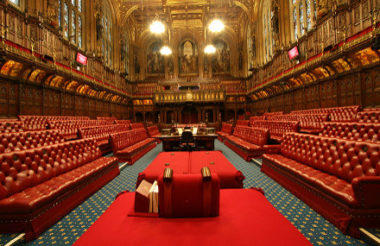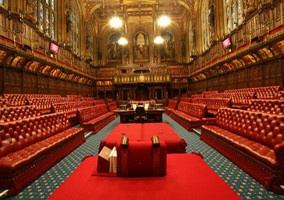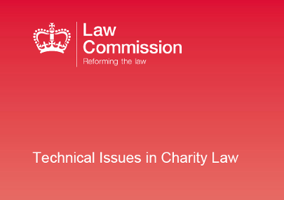Members of the House of Lords suggested that the Charities Bill is a “missed opportunity” to make more fundamental reforms to support the sector.
The bill was debated last week during a second reading committee in the House of Lords, where peers on all sides were generally supportive of the measures.
However, some peers used the debate to suggest that the bill should go further in some areas, while others sought reassurance that there would be safeguards in place to prevent fraud.
Opening the debate, Baroness Barran, minister for civil society, said: “This bill improves the efficiency of the charity sector by implementing the majority of the recommendations from the Law Commission’s Technical Issues in Charity Law report.”
These simplifications include: making it easier for charities to sell land and to use money donated to a fundraising appeal that either fails to meet its target or overhits its target for similar purposes. It also introduces more flexibility for those with permanent endowments.
“Rather than be overburdened by overly bureaucratic processes, charities will be able to focus their resources on the public good,” Barran said.
Hodgson: Charity Commission is ‘under the sway’ of the attorney general
Lord Hodgson, a Conservative peer who was involved in the early stage of the reforms, told peers: “I take a certain paternal pride that a large number of the recommendations that I made have survived.”
However, he was critical of the bill for not going far enough in one area.
“The bill has my 100% support except in one serious matter,” he said. He thinks the Charity Commission should not have to defer to the attorney general.
“I imagine that most members will think of the Charity Commission as the all-powerful regulator of its sector. I certainly did before my review,” he said. “In fact, it is not. Its ultimate power is subject to the permissions of the attorney general.”
This means it can only appeal to the Charity Tribunal to appeal the operation of charity law with the consent of the attorney general. Hodgson described this as a “an extraordinary position”, and said the law as it stands means the charity regulator is “in the last resort under the sway of the attorney general”.
In practical terms, Hodgson gave the example of the long running case at the Royal Albert Hall, where the Charity Commission has been waiting four years for a decision from the attorney general about whether it can seek a legal ruling concerning an apparent conflict of interest.
Hodgson suggested that the Commission should need to tell the attorney general what it was doing, but should not need their permission.
‘Missed opportunity’
The Law Commission had made a similar recommendation and a number of peers backed Hodgson during the debate.
Lord Stevenson of Balmacara, Labour, agreed with Hodgson, and said he would back him if he was to table an amendment.
“I wonder whether this bill goes far enough,” he said. “In some senses we have the worst of both worlds. We have a relatively weak regulator, which is heavily burdened and not well resourced to do the sort of job it has.
“It has had, it could be said, a pretty poor reputation in recent years, although it has improved. The bill is a missed opportunity to rectify some of those issues, but it is wrong to try to change too much in this bill – probably we do have to wait for another opportunity – but I think we will regret that.”
In response, Barran said: “The attorney general has an important and valued role as protector of charities, and it would be wrong to change this as the result of a single case, as cited in the case of the Royal Albert Hall. To put this into context: references to the Tribunal are rare; there have only been two since it was set up in 2009.”
As she closed the debate she also reminded peers that because this is a Law Commission bill it will follow the special public bill committee procedure, meaning the government would “resist any amendment that is not directly related to implementing the Law Commission’s recommendations”.
Additional safeguards
Some peers sought reassurance from the minister that there would be appropriate safeguards to stop charities using money inappropriately, particularly around the increased flexibility to use donations for similar purposes if a fundraising appeal has not been successful, or been too successful.
Baroness Greengross, a crossbench peer and former chief executive of Age Concern England, said: “In most cases, the charities would use this money sensibly and as close as possible to the original, but experience has sadly taught me that there will be times when this will not be the case.”
She gave an example from her time at Age Concern where someone had defrauded a local Age Concern and used the money to build a house, but were caught and the money recovered.
“I had to travel out of London to where this local charity was based to convince the local police not to publicise the case to the national press. Fortunately, they agreed, for if they had not, the reputation of the national federation would have been undermined by the actions of an individual operating in a local charity.”
Greengross said rare examples like this underscored the importance of having “strong legal frameworks” even if it can be “cumbersome and time-consuming.”.
In response, Barran agreed about the “need for checks and balances” but said: “The current law requires charities to contact donors to offer to return the donation. This can sometimes be disproportionate to the size of the donation.”
Elsewhere, Baroness Goudie, Labour, said she is concerned about fundraising companies, where “sometimes the amount that they take is more than the charity is able to raise”.
“I have been involved in cases where charities have had great appeals but the companies that charities use to assist them in their appeal are not always transparent,” she said.
“As the bill proceeds, I would like to see us put in a few more clauses to protect charities from these companies and how we will be more transparent, because the companies that assist charities always get paid.”
Barran reminded peers that the rules around charities and their relationship with commercial partners already existed and were last updated in 2016.
Charity salaries
Meanwhile, Conservative peer Baroness Rawlings, a former president of NCVO, brought up the issue of charity salaries and admin costs.
She recalled being a voluntary nurse with the Red Cross when “only 7% was allowed” to be spent on administration, and complained that she could not see an equivalent figure on the Charity Commission’s website.
The latest data filed with Commission shows that the Red Cross had an income of nearly £245m, for the year ending December 2019. It spent nearly £200m on charitable activities and just under £50m on raising funds.
Rawlings said: “Today’s list of charities is so huge and varied and the legal position so diverse and complex, especially in the area of percentage deductions, that perhaps charity law should be revisited further than this bill.”
She highlighted that most charities are run mainly by volunteers and called for more transparency about how charities spend their money.
“What do the NCVO, Charity Commission and all those generous people who donate their money have to say about the alleged percentage that some charities pilfer yearly from the kitty?” she said.
“I repeat my question: why do so many so-called charities need to spend the X%? It is no doubt more than the 7% that I mentioned earlier. This hard-raised money is possibly being spent on overheads and administration, rent, organising events and salaries. The figures should be transparent and easy to access and check.”
Rawlings said she backs the bill, but urged the minister to find a way to include her “argument and its spirit” during the special committee stage.
Barran said: “We recognise that executive remuneration in charities remains a public concern. The government's position is that charities should be transparent about executive remuneration so that members of the public can decide whether they want to support a charity.”
She highlighted that the Register of Charities now includes how many people are in the higher pay bands for each charities and said some charities follow NCVO’s guidance on executive pay transparency.
On admin costs, Barran said: “I think some of the wider issues around transparency relate to the fact that we use ‘charity’ to cover organisations made up only of a few volunteers with an income of just a few thousand pounds – or even maybe a few hundred pounds – a year, and we use the same term for charities that spend hundreds of millions of pounds as year and are, for example, important delivery partners to government and local government. In some ways it is unhelpful that we do that.”
Related articles












